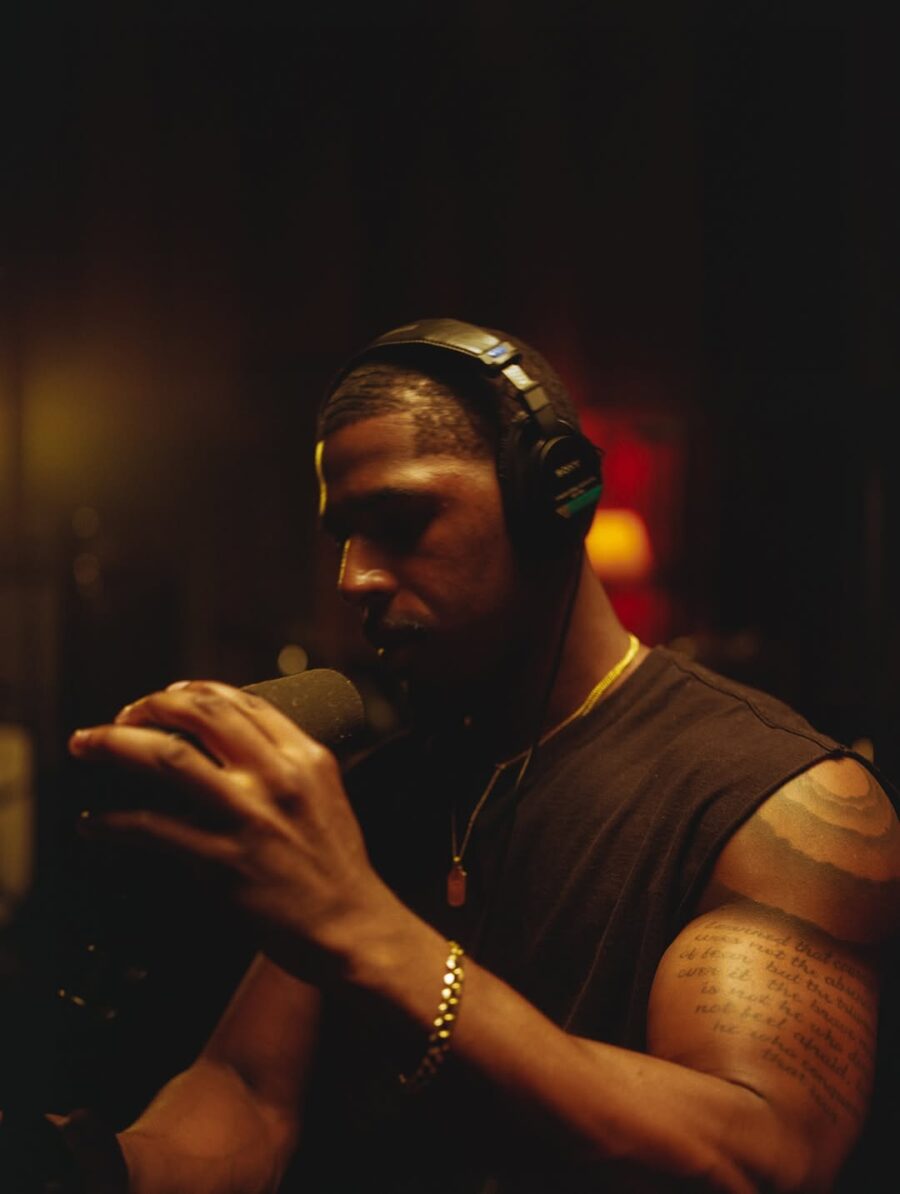In the dynamic landscape of contemporary R&B, a voice emerges that effortlessly blends classic soul sensibilities with modern introspection, establishing itself as a significant new figure: Khamari. His music is an invitation into a world of gentle sounds, thoughtful lyrics, and profound emotional openness. As an emerging artist, Khamari embodies the evolution of R&B, whose independent path, authentic artistry, and deep emotional resonance profoundly appeal to a global audience. This solidifies his reputation as a promising voice of a new R&B generation. As Complex magazine aptly noted about his debut album “Ariel”: “Ariel solidifies Khamari’s place as a crucial new voice in R&B, blending classic sensibilities with a fresh, contemporary edge.” This article explores Khamari’s formative years and musical identity, takes a detailed look at his discography and market presence, analyzes his unique positioning compared to his contemporaries, and provides an outlook on his future potential.
The Roots of a Sound, Origin and Musical Influences
Khamari’s musical journey began in Boston, Massachusetts, where he was born, before he later moved to Los Angeles. This geographical shift, particularly the move to a major music hub like LA, was crucial for his artistic development and musical exposure. Early on, he progressively immersed himself in the world of music, from being a “choir kid” to a “band kid” and then a “studio kid” in high school. This progression underscores his natural and deepening commitment to his craft.
His musical influences are deeply rooted in various genres that shaped his soundscape: Gospel, Soul, Jazz, and Hip-Hop. Khamari names a range of artists as important influences who significantly impacted his approach to music and lyricism. These include classic Soul and R&B masters such as Donny Hathaway, Stevie Wonder, and Bill Withers, as well as contemporary figures known for their introspective and genre-bending approaches, including Frank Ocean, Daniel Caesar, and James Blake. This blend of historical and modern influences is not just a list of inspirations; it represents a conscious synthesis that defines his unique artistic position. The classic influences form the foundation of the “soul” and “emotive vocals” that anchor his music in the rich tradition of R&B. At the same time, contemporary influences contribute to his “introspective,” “dreamy,” and “Alternative R&B” sound, fostering his willingness to explore vulnerability and unconventional song structures. This fusion allows him to appeal to both lovers of classic R&B and listeners seeking modern sonic experiments, effectively bridging generational gaps within the genre. Khamari himself summarizes this duality: “Artists like Donny Hathaway and Stevie Wonder taught me the power of a voice, while Frank Ocean showed me how much you can say without saying too much.” This strategic mix of influences is a crucial differentiator in a highly competitive music market. It allows Khamari to appear both familiar and refreshingly new, significantly contributing to his status as a “promising voice” by demonstrating a deep respect for R&B’s past while actively pushing its boundaries.

Artistic Identity, Genre, Aesthetics, and Songwriting Style
Khamari’s music is primarily categorized as “Alternative R&B” or “Contemporary R&B,” but retains strong “Soul” elements. His distinctive sound is characterized by “gentle,” “introspective,” “vulnerable,” and “dreamy” qualities. Particularly noteworthy are his characteristic “emotive vocals” and the “lush production” that creates his immersive soundscapes. These elements invite listeners into a unique sonic world.
Visually, Khamari maintains a consistent brand identity described as “minimalist,” “cinematic,” and “moody,” often utilizing “natural light” to create a specific atmosphere. His visual representations, frequently depicting “urban landscapes” or “intimate settings,” complement his music by focusing on “emotional resonance” rather than flashy or exaggerated displays. This visual coherence reinforces the themes of introspection and authenticity found in his music.
His songwriting approach is profound and personal. Khamari consistently focuses on “introspective lyrics” deeply rooted in “personal experiences,” “relationships,” and themes of “self-discovery.” “Vulnerability” and “authenticity” are the core values that permeate his narrative, and he skillfully uses “metaphors” and narrative techniques to convey complex emotions. An example of this is the line from his track “Another Round”: “Lost in the rhythm, finding my way back home,” which perfectly illustrates his introspective and searching style. This strong alignment across all facets of his artistic creation – music, lyrics, and visuals – is not accidental; it functions as a conscious and highly effective brand strategy in a saturated music market. A coherent artistic identity helps an artist stand out, build recognition, and gain a loyal following. Khamari’s consistent portrayal of introspection and vulnerability in every artistic medium creates a powerful, relatable persona. This deep consistency fosters trust and a deeper connection with listeners who increasingly seek genuine artistic expression. This is particularly important for independent artists who rely on organic engagement rather than massive marketing budgets. His own statement reinforces this: “I just want to make music that feels honest to me. If it connects with people, that’s the biggest reward.” This holistic approach to art, where every element reinforces the central theme of introspection and authenticity, is a key factor in his organic growth and critical acclaim. It allows him to cut through the noise by offering a complete, immersive artistic experience rather than just individual songs.

The Path to Recognition, Releases and Streaming Success
Khamari’s discography shows a clear and strategic build-up of his career. His debut was the EP “Eldorado” in 2020, praised for its “coherent sound” and as a “promising debut.” Tracks like “The Four of Us” stood out. In 2022, the EP “A Brief Nirvana” followed, demonstrating significant “growth in songwriting and production,” with prominent tracks such as “Drifting” and “Right My Wrongs.”
The decisive milestone, however, was his debut album “Ariel” in 2023. It received widespread acclaim for its “depth,” “maturity,” and “sonic coherence.” Key tracks like “Another Round” and the strategic re-inclusion of “Right My Wrongs” (which had already appeared on an earlier EP) underscored the album’s enduring popularity and thematic relevance. Complex’s aforementioned assessment that “Ariel solidifies Khamari’s place as a crucial new voice in R&B, blending classic sensibilities with a fresh, contemporary edge” highlights the impact and critical consensus surrounding the album.
Individual singles also played an important role, including “The Four of Us,” “Drifting,” and especially “Another Round,” which became a breakthrough hit.
His commercial success is reflected in impressive streaming numbers. “Another Round” surpassed 60 million streams on Spotify, and “The Four of Us” reached over 20 million streams. Following the release of “Ariel,” Khamari peaked at 4 million monthly listeners, illustrating his rapidly growing reach and audience engagement across various platforms.
This release strategy, encompassing two EPs before the debut album, demonstrates a gradual, deliberate approach to building his discography and audience. Releasing EPs allows for a continuous flow of new music, keeping the audience engaged and maintaining momentum without the significant pressure and investment required for a full album. This also serves as a testing ground for new sounds and allows for iterative growth. The breakthrough success of singles like “Another Round” highlights their power as entry points for audiences and as viral catalysts that generate broader interest in the larger projects. The re-inclusion of a popular track like “Right My Wrongs” on the album leverages existing fan familiarity and boosts album streams, demonstrating clever recycling of successful content. This staggered release strategy minimizes risks and maximizes organic audience growth. Khamari’s streaming success is thus not merely a quantitative achievement; it is qualitative proof of an effective digital strategy and profound audience resonance. It shows that his introspective R&B, though niche, possesses significant mainstream potential when the right track breaks through, affirming his independent path and the inherent quality of his music.

In the Music World’s Network, Collaborations, Label, and Media Reception
Khamari’s approach to collaborations is deliberate and focused. He has a limited number of features, primarily with key producers like Trackside and BLVK. This strategic restraint stems from his strong focus on “developing his own sound” and solidifying his artistic identity before engaging in extensive external features. This underscores his artistic integrity and self-reliance. He has expressed openness to future collaborations, indicating a strategic, non-exclusive stance that he will collaborate when it truly serves his artistic vision.
A crucial aspect of his career is his status as an independent artist who has entered into a distribution partnership with AWAL. The significance of this choice for his career is profound, as he explicitly emphasizes maintaining “creative control” and ensuring “authenticity” in his music. This reinforces the overarching narrative of his organic growth and unwavering artistic vision, free from the constraints of major labels. In today’s music landscape, especially for artists operating in nuanced or alternative genres like R&B, independence (particularly when coupled with a robust distribution partner like AWAL) can be a significant competitive advantage, not a limitation. This model allows for a direct connection to fans, an uncompromising artistic vision, and a more organic, sustainable build-up of a dedicated fanbase, which perfectly aligns with his core message of “authenticity.” His conscious decision for limited collaborations suggests a focus on solidifying and refining his unique artistic voice before extensive branching out, creating a stronger, more resilient foundation for a long-term career.
Media reception to Khamari’s work has been consistently positive. Prominent music publications such as Pigeons & Planes, Hypebeast, Complex, and FADER have continuously praised him. He has been described as “one to watch” or a “rising star,” and critical acclaim for his “vulnerability” and “unique sound” is constant. Complex’s already cited statement about “Ariel” – “Ariel solidifies Khamari’s place as a crucial new voice in R&B, blending classic sensibilities with a fresh, contemporary edge” – underscores the strong critical consensus surrounding his debut album. Khamari’s success story is a compelling testament to the evolving dynamics of the music industry. It shows that artists can achieve significant critical acclaim and commercial viability without major label support, without sacrificing artistic integrity.
The Stage as Expression, Live Performances and Artistic Development
Khamari’s live presence is captivating and demonstrates remarkable development on stage. His early experiences opening for established artists like Leon Bridges and Daniel Caesar provided him with valuable exposure. He successfully transitioned to headlining smaller, sold-out shows in major music centers like Los Angeles and New York City and participated in the influential SXSW festival in 2023. Critical acclaim for his “intimate” and “captivating” performances is consistent, with his exceptional “vocal delivery” particularly highlighted as a cornerstone of his live appeal. Given that his studio sound is characterized by “introspection” and “vulnerability,” an “intimate” live performance style is a natural and profoundly impactful reinforcement of his brand. It allows him to seamlessly translate the emotional depth and nuanced production of his studio recordings into a tangible, shared, and immediate experience, deepening the bond with his audience. This direct connection is absolutely crucial for independent artists who rely heavily on word-of-mouth, genuine fan loyalty, and community building.
His artistic development as an independent artist is a meticulous path of strategic and organic growth. He began by self-releasing demos on SoundCloud to build an initial audience. Subsequently, he cultivated a “grassroots following” before strategically partnering with AWAL for distribution. He consistently emphasizes his unwavering commitment to “patience” and “organic growth,” highlighting these as core principles of his career philosophy. He places great importance on “direct connection with fans,” a hallmark of his independent approach. This is not just a personal preference; it is a conscious and highly effective strategic plan that counteracts the often unsustainable “quick fame” model prevalent in some parts of the industry. By prioritizing organic growth and direct fan connection, he cultivates a more resilient and loyal fanbase that is less susceptible to fleeting trends or artificially generated hype. The emphasis on “patience” implies a long-term vision where artistic integrity and genuine connection take precedence over immediate commercial pressures. This approach grants him the freedom for authentic artistic development without external interference, which is crucial for preserving the “vulnerability” and “authenticity” that define his unique sound. Khamari’s journey is a microcosm of the larger, ongoing shifts within the music industry. It points to a future where independent artists increasingly shape genre trends, influence mainstream taste, and demonstrate viable and artistically fulfilling paths outside traditional record label structures.

Positioning in the Music Market, A Comparison with Contemporaries
Khamari has strategically carved out a unique niche within the broader R&B landscape. His core characteristics – his commitment to “introspective R&B,” his willingness to “genre-bend,” and his distinctive “vulnerable lyricism” – collectively contribute to his unique appeal and effectively differentiate him in a crowded genre.
A detailed comparison with established artists such as Frank Ocean, Steve Lacy, and Daniel Caesar illuminates Khamari’s position. He shares common thematic and sonic foundations with them, including a common thread of introspective themes, a fluid movement across genre boundaries, and a deep emphasis on emotional depth in their music.
Nevertheless, there are clear differences that highlight his unique selling points:
- Vs. Steve Lacy: Khamari’s sound is explicitly described as “softer” and “less experimental” than Lacy’s. This distinction suggests a more accessible, perhaps less avant-garde approach to Alternative R&B, which nevertheless retains its artistic integrity and depth.
- Vs. Frank Ocean: Khamari’s sound is characterized as “more direct” than Ocean’s. This suggests a less abstract or elusive lyrical and sonic presentation, which may make his emotional narratives and themes more immediately relatable and impactful for a broader audience.
- Vs. Daniel Caesar: Khamari shares a “similar emotional depth” with Caesar. This comparison positions him as a strong vocalist and songwriter capable of conveying profound emotions.
These comparisons solidify Khamari’s place as a distinct yet equally captivating and important voice within this influential cohort of modern R&B innovators. He appeals to listeners who value depth, authenticity, and emotional resonance without necessarily seeking extreme sonic experimentation, thus carving out his own significant niche. His ability to be both sufficiently similar to attract fans of these established artists and sufficiently distinct to offer something fresh is crucial for his marketability and continued growth. It suggests a sophisticated understanding of his target audience and the competitive landscape, positioning him as a compelling alternative or complementary artist rather than a mere imitator.
The Potential of a New Era
Expectations for Khamari’s future development are high, marked by anticipation for “continued growth” and his “potential for a mainstream breakthrough.” It is expected that he will maintain his characteristic introspective style while subtly evolving his sound, possibly incorporating new influences or production techniques. Strong fan anticipation for “more touring” and “new music” indicates robust and engaged demand for his work.
Khamari is more than just a rising artist; he is a “torchbearer for a new wave of R&B.” His potential to influence the genre is significant, driven by his unwavering commitment to authentic artistic expression, his proven independent success model, and his unique ability to seamlessly blend classic soul elements with contemporary R&B sensibilities. As an independent artist who prioritizes authenticity and organic growth, Khamari is inherently less subject to the commercial pressures that often dilute artistic vision or push towards generic, trend-driven sounds. This artistic freedom allows him to truly innovate, experiment, and push the boundaries of R&B, thereby actively contributing to its “new wave.” His success shows that the market is increasingly receptive to this independent, artist-driven development, which in turn encourages other artists to pursue similar paths. This fosters a more diverse, authentic, and artistically rich R&B landscape.
Khamari’s journey is a compelling example of the ongoing changes in the music industry. It illustrates a future where independent artists increasingly shape genre trends, influence mainstream taste, and demonstrate viable, artistically fulfilling paths outside traditional record label structures. His future potential therefore relates not only to his individual career growth but also to his symbolic role in demonstrating a sustainable and impactful model for the next generation of R&B musicians and beyond. Khamari is undoubtedly a significant and enduring voice in contemporary music, whose rise holds the promise of a fresh, profound, and authentic era of R&B.









